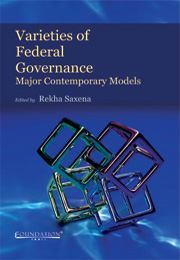Book contents
- Frontmatter
- Contents
- List of Contributors
- Foreword
- Acknowledgements
- Introduction
- I Theoretical and Comparative Dimensions
- 1 Federalism: An Alternative Category in Political Thought?
- 2 Governance of Capital Cities in Federal Countries: Comparative Perspectives
- II Presidential Federal Systems
- III Commonwealth Parliamentary Federations
- IV Non-Commonwealth Parliamentary Federations in Afro-Asia
- V European Parliamentary Federations
- VI Devolutionary Systems
- VII Supranational Confederalism/Federalism?
2 - Governance of Capital Cities in Federal Countries: Comparative Perspectives
from I - Theoretical and Comparative Dimensions
Published online by Cambridge University Press: 05 June 2012
- Frontmatter
- Contents
- List of Contributors
- Foreword
- Acknowledgements
- Introduction
- I Theoretical and Comparative Dimensions
- 1 Federalism: An Alternative Category in Political Thought?
- 2 Governance of Capital Cities in Federal Countries: Comparative Perspectives
- II Presidential Federal Systems
- III Commonwealth Parliamentary Federations
- IV Non-Commonwealth Parliamentary Federations in Afro-Asia
- V European Parliamentary Federations
- VI Devolutionary Systems
- VII Supranational Confederalism/Federalism?
Summary
Capital cities are unique as they are seen as an important symbol of the entire country. This symbolism has special meaning for federal countries, which tend to be diverse or large, or both. Consequently, in federal countries, the choice of a capital city, its location, its monuments, and its governance arrangements have to reflect this diversity while at the same time being as neutral as possible with respect to individual states or provinces. Not surprisingly, therefore, several capital cities are located on historic regional, linguistic, or ethnic borders. The Nigerian capital, Abuja, is located in the geographic centre of a very diverse country, and is home to both a grand mosque and a national cathedral, which together, represent the country's two great religions. Similarly, Brussels, as Belgium's only bilingual region, reflects the country's linguistic and cultural diversity. Bern's position in the relative centre of the country in close proximity to the French part (and its relative unimportance as an urban centre) contributed to its selection as the seat of the Swiss government. In Germany, the decision to relocate the capital to Berlin (because it is the only major urban centre that straddled the east-west divide) was an important gesture in the process of integrating the eastern Lander. Not surprisingly, the location and status of capitals remain a bone of contention in many emerging federations such as Iraq.
Very little has been written about capital cities and even less on their finance and governance. Moreover, the few studies that have been written do not focus on the particular issues of capital cities in federal countries.
- Type
- Chapter
- Information
- Varieties of Federal GovernanceMajor Contemporary Models, pp. 18 - 34Publisher: Foundation BooksPrint publication year: 2011



